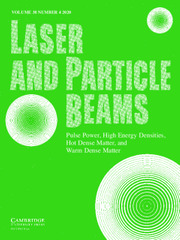Article contents
X-ray emission induced by 1.2–3.6 MeV Kr13+ ions
Published online by Cambridge University Press: 30 October 2012
Abstract
X-ray emission from Kr13+ ions in the energy range 1.2–3.6 MeV in steps of 0.6 MeV impacting on an Au target was investigated on electron cyclotron resonance ion source at the Heavy Ion Research Facility in Lanzhou. It was found that a shift of the X-ray lines to the higher energy side occurred. We measured the relationship between the characteristic of X-ray yield of Au M X-rays and Kr L X-rays as a function of incident energy. Furthermore, M-shell X-ray production cross-section of Au induced by Kr13+ was measured. The measured cross-section of target is compared to the classical binary-encounter approximation and plane-wave-born approximation theoretical model, which is a significant different between experimental and theoretical model.
- Type
- Research Article
- Information
- Copyright
- Copyright © Cambridge University Press 2012
References
REFERENCES
- 7
- Cited by


